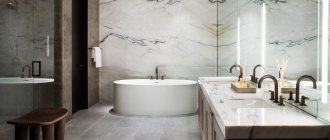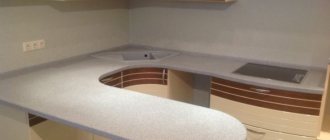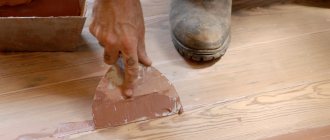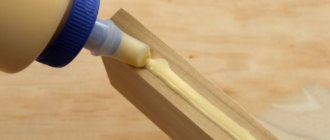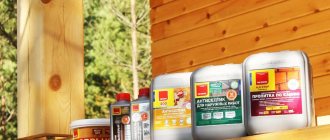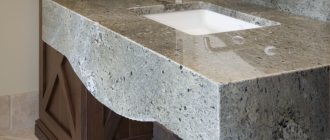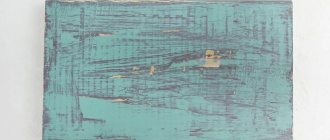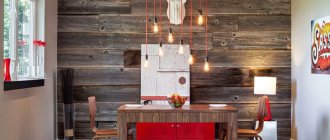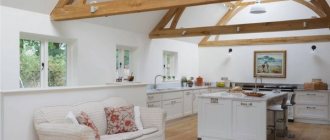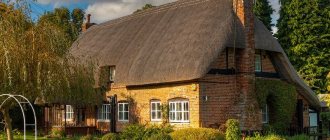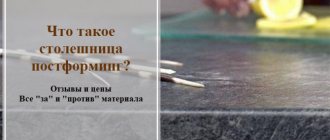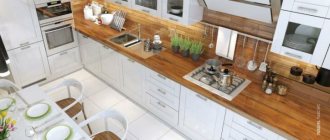Many consumers are familiar with the benefits of artificial stone. Items made from this material are often used in the interiors of kitchens, bathrooms, and hallways. Modern technologies make it possible to create high-quality imitations of natural minerals. You can choose marble, granite, onyx, etc. coatings. But not all homeowners prefer majestic, monumental designs. If you want to fill the atmosphere with warmth and comfort, an acrylic wood-look tabletop would be an excellent option. At ENOTSSTONE you can purchase a model for kitchen decoration by ordering the design to be made according to your dimensions.
Catalog of ready-made countertops made of artificial stone to look like wood
Rating↑ | Costs↓
- Show by
- 27
- All
Dark countertop for the kitchen made of artificial stone with wood effect
Manufacturer:
Corian
Material:
Hazelnut
Size:
0.8 m2
Price with installation: RUB 23,500.
More details Order
Grandex wood-effect bathroom countertop made of artificial material
Manufacturer:
Grandex
Material:
P-106 Pure Brown
Size:
0.9 m2
Price with installation: RUB 25,100.
More details Order
Bathroom countertop made of artificial material in wood effect Grandex 90 cm
Manufacturer:
Grandex
Material:
M-704 Shell Surface
Size:
1.2 m2
Price with installation: RUB 26,400.
More details Order
Light-colored wood kitchen countertop Grandex 80 cm
Manufacturer:
Grandex
Material:
M-701 Hazel Flow
Size:
2.7 m2
Price with installation: RUB 49,800.
More details Order
Wood-effect kitchen countertop made of artificial stone
Manufacturer:
Corian
Material:
Sorrel
Size:
2.4 m2
Price with installation: RUB 51,600.
More details Order
Wood-effect kitchen countertop Hi-Macs
Manufacturer:
Hi-Macs
Material:
G07 Platinum Granite
Size:
3 m2
Price with installation: RUB 71,600.
More details Order
Dark wood-look kitchen countertop
Manufacturer:
Grandex
Material:
M-708 Deep Water
Size:
4.2 m2
Price with installation: RUB 75,100.
More details Order
Wood-effect kitchen countertop made of Corian stone 3.5 m2
Manufacturer:
Corian
Material:
Hazelnut
Size:
3.5 m2
Price with installation: RUB 75,850.
More details Order
Wood-effect kitchen countertop made of artificial stone Corian
Manufacturer:
Corian
Material:
Hazelnut
Size:
5.1 m2
Price with installation: RUB 140,500.
More details Order
Beige wood-look countertop made of artificial stone
Manufacturer:
Corian
Material:
Sandalwood
Size:
5.1 m2
Price with installation: RUB 160,100.
More details Order
For lovers of natural textures in the interior, we recommend countertops made of artificial stone to resemble wood. They convincingly imitate wood cuts, have a natural color scheme, and add a feeling of warmth to the kitchen. Such a work surface will complement any furniture facades and will be appropriate in ethnic or country style interiors.
Unlike wood, artificial stone is not susceptible to rotting, moisture, swelling, or fungus formation. It has a dense texture without pores: contaminants are not absorbed into it and do not form an environment for bacteria. Cleanliness and hygiene – what could be more important for a kitchen?
MDF
It is also a finely dispersed fraction. The basis is a slab material, on top of which a high-strength laminate is applied, complemented by a protective coating. To extend service life, a layer of plastic is placed on top. It is he who can imitate wood and other materials.
The factor of using plastic leads to an increase in price. But the surface becomes more moisture-resistant, durable and visually attractive.
The advantages include:
- affordable price;
- environmental friendliness;
- a wide range of;
- the ability to imitate wood and more;
- protection against fungus and other microorganisms.
But don't forget about the downsides. Here they are as follows:
- low level of fire safety;
- poor resistance to mechanical damage;
- limited service life;
- possibility of bloating.
Only if the material has undergone special processing can MDF be used in the kitchen as a countertop. Otherwise, the product will not last long and will quickly become unusable.
Standard prices for the production of countertops made of artificial stone under wood
| Manufacturer | Cost, rub/m2 |
| Corian, USA | from 10900 |
| Staron, Korea | from 9600 |
| Hi-Macs, Korea | from 8000 |
| Tristone, Korea | from 7800 |
| Hanex, Korea | from 7900 |
| Grandex, Korea | from 7600 |
| Montelli, China | from 7500 |
| Akrilika, China | from 9700 |
Array
See also
Furniture cornice: why is it needed, how to install it yourself
When it comes to countertops, species such as oak, walnut, ash, maple, cherry and bamboo are suitable for such purposes. Wood does not like moisture or temperature changes and actively absorbs moisture.
To get rid of imperfections, wood is treated, impregnated and protected with special coatings. Even after this, you should not install it near the dishwasher or taps.
Strengths:
- naturalness;
- no need to imitate wood;
- natural warmth;
- environmental friendliness;
- hygiene;
- relatively good service life;
- possibility of updating the appearance by sanding (multiple).
But let's not forget about the shortcomings.
Wood, as a material for making kitchen countertops, has the following disadvantages:
- limited color palette;
- danger of swelling at joints and cracks;
- strict care requirements;
- the need to remove any moisture;
- weak resistance to fire;
- low thermal stability;
- Possibility of damage from dyes and acidic substances.
Not bad, but for those who constantly cook in the kitchen, this is not the best option. Plus it's too expensive for such shortcomings.
Additional services
| Service | Price |
| Departure for measurements | For free |
| Delivery in Moscow within the Moscow Ring Road | 2500 rub. |
| Delivery outside the Moscow Ring Road | 2500 rub. + 35 rub./km |
| Making a template | For free |
| Climb | 300 rub/floor for 1 lift |
| Installation of tabletops to cabinets | 500 RUR/m2 |
| Installation of window sills | 500 RUR/m2 |
| Additional work | 1300 rub./standard hour |
| Removing the countertop | 850 rub./p.m. |
Edge and side options
| Edge/side | Description | Cost per linear meter, rub. |
| Direct transition to the baseboard | free up to 30 mm in height, excess for every 10 mm - 270 | |
| Smooth transition to the baseboard | 1760 | |
| Standard edge | for free | |
| Gluing the stone from below | up to 30 mm - 1400, excess for every 10 mm - 270 | |
| Single straight cut at 45° angle | 400 | |
| Double straight cut at 45° angle | 800 | |
| Single radius cut | for free | |
| Double radius cut | 400 | |
| Single curly cut | 400 | |
| Double curly cut | 800 | |
| "Anti-overflow" in a straight line | 1500 | |
| Inserting a stone of a different color | 2000 | |
| Radius insertion | 2700 |
Calculate the cost of countertops online
How to make an order
Call the company or apply on the website
The surveyor arrives at any time convenient for you with all stone samples
Approval of the project and conclusion of the contract
Manufacturing of the product, period - from 3 days
We will deliver and install the product at any time convenient for you by agreement
Chipboard
Also, countertops are actively produced on the basis of particle boards. The top is covered with plastic, and before that with kraft paper with synthetic resins. Everything ends with a decorative layer, where one of the options is imitation wood.
See also
Console tables: design options, buy or make yourself
The advantages are:
- high-quality and realistic imitation of wood and other materials;
- low price;
- fast production;
- huge assortment;
- simple processing;
- easy installation;
- Possibility of quick replacement when worn out.
But be careful and careful when choosing chipboard. Even fairly high-quality products have a number of disadvantages.
The disadvantages are as follows:
- traces of drinks and ordinary water remain;
- swelling occurs from contact with moisture;
- not particularly heat resistant;
- fire hazardous;
- period no more than 10 years;
- impregnations that are potentially harmful to health.
Really cheap, but too many resulting shortcomings. Not the best option for those who want a high-quality, functional and durable countertop. Even moisture-resistant impregnation does not help much, as the reviews of the owners clearly indicate.
A natural stone
See also
DIY wall bars: how to make it simply and cheaply
Almost the most expensive option. The base is quartz, onyx, marble or granite. But it is recommended to install such countertops where they will not be exposed to frequent exposure and use.
See also
DIY corner shelf for icons: the best ideas for making
The advantages are:
- original appearance;
- naturalness;
- solidity;
- resistance to liquids and substances;
- scratch and abrasion resistance;
- heat resistance;
- hygiene;
- environmental friendliness;
- durability.
There are also disadvantages. Moreover, their list is impressive.
Namely:
- high price tags;
- visibility of joints;
- limited color palette;
- strict requirements for the strength of the cabinet;
- restrictions on form;
- poor resistance to strong mechanical stress;
- some liquids leave traces;
- complex installation.
Interesting, original, but still overly expensive. But if your budget allows, you shouldn’t deny yourself the pleasure.
How to make a tabletop
To reduce the cost of furnishing your kitchen, you can make a wooden countertop with your own hands.
Of course, this task is quite complex, but we hope that the instructions given in this article, as well as the explanatory video, will help you cope:
- We carefully dry the boards selected for the tabletop (optimal humidity is no more than 10%), and then soak them with an antiseptic.
- We process the boards on a planer, achieving a perfectly smooth and even surface.
Milling a groove
- We make grooves at the ends of the long sides of the boards using a hand router. After milling, we carefully sand the planes of the boards, ensuring they fit as tightly as possible.
Advice! For a table top made of a thick board, the optimal width and depth of the groove is 10-12 mm; for a thin board, 6-8 mm is sufficient.
- We begin to assemble our tabletop: first, we glue a strip into the groove of one of the boards, the width of which is twice the depth of the groove. You can see the connection diagram in the photo.
- Then we put the groove of the next board onto the glued strip. Using this principle, we assemble the entire tabletop.
- We carefully sand the glued tabletop, then treat it with oil or varnish.
